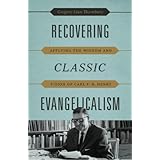You can read a full review of Gregory Alan Thornbury's "Recovering Classic Evangelicalism: Applying the Wisdom and Vision of Carl F.H. Henry (Crossway 2013) here. There are, not surprisingly, many other reviews available on the web. (Check here and here for two examples that have it about right.)

I suppose I could say that I have one an a-half bones to pick with "Recovering Classic Evangelicalism." There are many points at which I agree with Thornbury but a couple of problematic assertions stand out. First, is his excoriation of contemporary theologians for failing to preface their systematic theology texts with sufficient epistemological prolegomena. Thus, Thornbury writes:
Blasting Grudem, Horton, and Reymond for not prefacing their works with a chapter or two of epistemology would be like criticizing Thornbury for not appending 1000 pages of systematic theology to his epistemologically-centric "Rediscovering Classic Evangelicalism." It's hardly helpful to criticize others for not writing the book you wanted them to write but couldn't write yourself. And what about the classic of yesteryear, Louis Berkhof's "Systematic Theology," where Thornbury's prized front matter occupies about 14 pages? And why didn't Thornbury give some props to Gordon Spykman's "Reformational Theology: A New Paradigm for Doing Dogmatics" that devotes four chapters to such stuff? (Probably because he didn't like it.) And why did he ignore John Frame whose "Doctrine of the Knowledge of God" is a full volume of epistemology that prefaces his subsequent systematic theological texts?
I hope my point is clear. I too find questions like "what is knowledge" and "how do we know?" of great interest. I do not, however, find the absence of their extended discussion in a work of systematic theology something to kvetch about.
My half a bone to pick is more a matter of emphasis. Thornbury's fetishization of questions of knowledge makes him prone to depreciate the biblical text in favor of the events described in that test. The events described in the Bible certainly happened but it is Scripture's authoritative interpretation of those events that drives the theological enterprise, not a theologian's speculative recasting of the meaning of those events to support this, that, or the other hobby-horse. In other words, I hope to practice biblical theology not event theology.
"Rediscovering Classic Evangelicalism" is a valuable resource for acquainting a new generation with the work of the late Carl Henry. It's also useful for grasping Thornbury's more pointed--and frequently valid--criticisms of postliberal and structuralist accounts of the theological enterprise. Yet, "Rediscovering Class Evangelicalism" would have been better had Thornbury not gone out of his way to pick unnecessary fights that he's not going to win.

I suppose I could say that I have one an a-half bones to pick with "Recovering Classic Evangelicalism." There are many points at which I agree with Thornbury but a couple of problematic assertions stand out. First, is his excoriation of contemporary theologians for failing to preface their systematic theology texts with sufficient epistemological prolegomena. Thus, Thornbury writes:
I remember how disappointed I felt at the release of the first edition of Wayne Grudem's Systematic Theology when I cracked open the volume to discover that there was virtually no traditional prolegomena to theology in the work. The entire basis for doing evangelical theology was missing. [sic] Gone was a discussion of definitions of theology, philosophical criteria, considerations of arguments for the existence of God, and so forth. (34)Even someone like Michael Horton whose Reformed chops cannot be gainsaid doesn't measure up to Thornbury's idiosyncratic standards. Robert Reymond? Nope, because he dealt with philosophical issues in a "cursory fashion" perhaps only "out of sense of obligation, rather than as a fundamental stage upon which the grandeur of the evangelical enterprise was to be engaged." (35) Sheesh.
Blasting Grudem, Horton, and Reymond for not prefacing their works with a chapter or two of epistemology would be like criticizing Thornbury for not appending 1000 pages of systematic theology to his epistemologically-centric "Rediscovering Classic Evangelicalism." It's hardly helpful to criticize others for not writing the book you wanted them to write but couldn't write yourself. And what about the classic of yesteryear, Louis Berkhof's "Systematic Theology," where Thornbury's prized front matter occupies about 14 pages? And why didn't Thornbury give some props to Gordon Spykman's "Reformational Theology: A New Paradigm for Doing Dogmatics" that devotes four chapters to such stuff? (Probably because he didn't like it.) And why did he ignore John Frame whose "Doctrine of the Knowledge of God" is a full volume of epistemology that prefaces his subsequent systematic theological texts?
I hope my point is clear. I too find questions like "what is knowledge" and "how do we know?" of great interest. I do not, however, find the absence of their extended discussion in a work of systematic theology something to kvetch about.
My half a bone to pick is more a matter of emphasis. Thornbury's fetishization of questions of knowledge makes him prone to depreciate the biblical text in favor of the events described in that test. The events described in the Bible certainly happened but it is Scripture's authoritative interpretation of those events that drives the theological enterprise, not a theologian's speculative recasting of the meaning of those events to support this, that, or the other hobby-horse. In other words, I hope to practice biblical theology not event theology.
"Rediscovering Classic Evangelicalism" is a valuable resource for acquainting a new generation with the work of the late Carl Henry. It's also useful for grasping Thornbury's more pointed--and frequently valid--criticisms of postliberal and structuralist accounts of the theological enterprise. Yet, "Rediscovering Class Evangelicalism" would have been better had Thornbury not gone out of his way to pick unnecessary fights that he's not going to win.




No comments:
Post a Comment